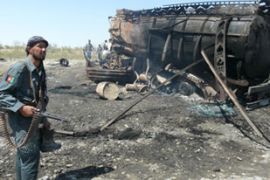Nato begins Afghan bombing inquiry
Launch of Kunduz investigation coincides with blast targeting German military convoy.

“We don’t yet know how many civilians” were at the site of the blast, Smith said. “Unfortunately, we can’t get to every village.”
Yet, danger continues to lurk for international forces in Kunduz. A bomb blast hit a German military convoy, injuring at least three soldiers, the news agency DPA reported.
Abdullah Razaq Yaqoobi, the Kunduz police chief, said a suicide car bomb caused Saturday’s blast, though German military officials blamed a roadside bomb.
The Taliban quickly claimed responsibility for the attack. The bomber came from Chardarah district in Kunduz, Zabiullah Mujahid, a spokesman for the group, said.
Nato chief’s pledge
The developments come a day after Anders Fogh Rasmussen, Nato’s secretary-general, pledged to conduct a full investigation into the air strike in Kunduz that destroyed two hijacked fuel tankers and killed civilians as well as suspected Taliban fighters.
”The people of Afghanistan must be aware that we clearly maintain the commitment of protecting them, and we will investigate thoroughly,” he said.
| in depth |
|
UK official quits over war US trapped in ‘bitter war’? On the frontlines with US troops Interview with chairman of the US joint chiefs of staff |
The UN mission in Afghanistan, headed by Peter Galbraith, also dispatched its own investigation, emphasising that “the families of the victims must receive all the help they need”.
Brigadier-General Eric Tremblay, spokesman for the Nato-led International Security Assistance Force, told Al Jazeera that Isaf would “do whatever is needed to be done to investigate and provide as much support as is needed”.
Friday’s incident has raised serious questions about how Nato and US troops engage with their enemy, James Bays, Al Jazeera’s correspondent in Afghanistan, said.
Reporting from the bomb site, about 7km southwest of Kunduz city, he said it was impossible to count the dead – some bodies had completely disappeared while others were burnt beyond recognition.
He quoted a hospital source as putting the toll at 56 killed and 13 injured.
“But it is clear that many who died here were not fighters, some were children. The mood of many of the people here is sorrow and great anger,” our correspondent said.
“People here say they are losing confidence in both the Afghan governmnent and the international forces, now the loss of so many lives will only increase that unease.”
Strained relations
Civilian casualties are increasingly straining relations between Afghans and international forces.
Robert Gates, the US defence secretary, told Al Jazeera in a first interview since Barack Obama came to power, that poor relations would make troop increases unlikely.
“I’ve had a number of reservations about significant additional US troops … if our forces should come to be seen at some point as occupiers rather than partners”, he said.
The Kunduz attack occurred at around 2am local time on Friday, 40 minutes after German and Afghan forces called in air support.
They reported the two tankers had been hijacked by fighters as they travelled from Tajikistan to supply Nato forces in Kabul. The Taliban tried to transport the tankers across a river to villages in Angorbagh.
They managed to take one of the tankers over the river. The second got stuck, so the fighters apparently opened valves to lighten the load and called in villages to help themselves to fuel, according to witnesses.
At this point, the Nato bombs hit the tankers. Nato insists its commanders believed only fighters were present, but now accepts that this was not the case.
Declining support
Afghan anger over civilian deaths caused by international forces compounds the problems being faced by the US administration over rising military casualties.
Many Democrats are unhappy with President Obama’s decision to send 21,000 extra troops to Afghanistan.
Others want the administration to scale down US military involvement in the country.
But Gates told Al Jazeera that he opposed the very idea of starting preparations for troop withdrawal.
He said he would not talk about victory or defeat but rather about achieving goals.
The issue is not only related to the US, but also to the Afghan government, the Afghan people and numerous governmental and non-government organisations operating in the country, Gates said.
